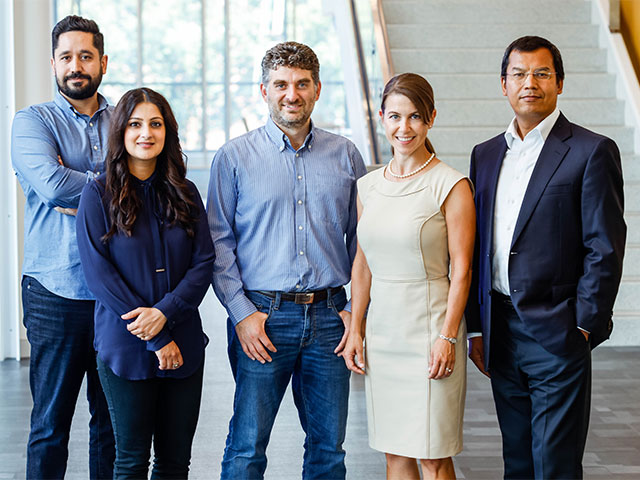Donald Danforth Plant Science Center Partners with Saint Louis University to Deploy Edge Computing to More Broadly Share Farm Intelligence
ST. LOUIS, MO, September 15, 2022 – Researchers at the Donald Danforth Plant Science Center and Saint Louis University are collaborating to create a cyber-physical system to better share agricultural data among the scientific community.
The project, “Collaborative Research: CPS: TTP Option: Medium: Sharing Farm Intelligence via Edge Computing,” is supported by a $1.2 million grant from the National Science Foundation and will be led by Flavio Esposito, Ph.D., associate professor of computer science at Saint Louis University, and Nadia Shakoor, Ph.D., principal investigator at the Donald Danforth Plant Science Center. The research team also includes SLU faculty Kate Holdener, Ph.D., assistant professor of computer science; Reza Tourani, Ph.D., assistant professor of computer science; and Vasit Sagan, Ph.D., associate professor of earth and atmospheric sciences.
The cross functional team of scientists aim to make agricultural data collection and data processing easier for scientists by combining their expertise in plant science, secure networked systems, artificial intelligence, privacy, and software engineering.

“It’s critical that we create and share a Cyber-Physical System with our international partners that is scalable, practically useful, and accurately translates and integrates data collected from vastly different sensing modalities deployed in agricultural environments across the globe,” said Shakoor.
The Cyber-Physical System will be evaluated in a laboratory at Saint Louis University and deployed on crop farms in Missouri, Illinois, and Tennessee using sensors, such as hyperspectral and thermal cameras to collect imagery crops that have high potential for carbon capture and future climate resiliency such as soybean and sorghum will be of key focus in this project.
“Understanding and detecting local climate change impacts on agriculture such as predicting yield in various stress scenarios or performing real-time plant pathology assessments is critically important in agriculture but requires an integration of multiple datasets, including imagery data collected from static and moving sensors, crop physiology data, and climate data,” said Esposito. “Our system aims to reduce the timeline to analyze, normalize, and fuse farm-collected datasets.”
Preprocessed plant datasets will be offered to scientists and farmers, ready to be processed by deep learning algorithms or consumed by thin clients.
“Data collected by Internet of Things deployed on different crop farms will be processed by secure distributed deep learning systems, using novel network and software architectures,” said Esposito. “Such results will be then consumed by farmers and plant scientists to predict plant stress and detect pathogens.”
Finally, the Cyber-Physical System will integrate novel data processing software with existing NSF-funded hardware platforms, introducing novel algorithmic contributions in edge computing and giving feedback to farmers, closing the loop. The results will be shared with international organizations whose goal is to increase food security and improve human health and nutrition.
The grant includes planned outreach activities involving smallholder farmers in different states, and collaborators at the International Center for Agricultural Research in the Dry Areas (ICARDA).
National Science Foundation
The National Science Foundation (NSF) is an independent federal agency created by Congress in 1950 to promote the progress of science; to advance the national health, prosperity, and welfare; and to secure the national defense. With an annual budget of $8.8 billion, the NSF is the funding source for approximately 27% of the total federal budget for basic research conducted at U.S. colleges and universities. In many fields such as mathematics, computer science and the social sciences, NSF is the major source of federal backing.
Saint Louis University
Founded in 1818, Saint Louis University is one of the nation’s oldest and most prestigious Catholic institutions. Rooted in Jesuit values and its pioneering history as the first university west of the Mississippi River, SLU offers nearly 13,000 students a rigorous, transformative education of the whole person. At the core of the University’s diverse community of scholars is SLU’s service-focused mission, which challenges and prepares students to make the world a better, more just place.
Donald Danforth Plant Science Center
Founded in 1998, the Donald Danforth Plant Science Center is a not-for-profit research institute with a mission to improve the human condition through plant science. Research, education and outreach aim to have impact at the nexus of food security and the environment and position the St. Louis region as a world center for plant science. The Center’s work is funded through competitive grants from many sources, including the National Science Foundation, National Institutes of Health, U.S. Department of Energy, U.S. Agency for International Development, and the Bill & Melinda Gates Foundation. Follow us on Twitter at @DanforthCenter.
For more information contact:
Danforth Plant Science Center, Karla Roeber, kroeber@danforthcenter.org, 314.406.4287
Saint Louis University, Maggie Rotermund, maggie.rotermund@slu.edu, 314.977.8018